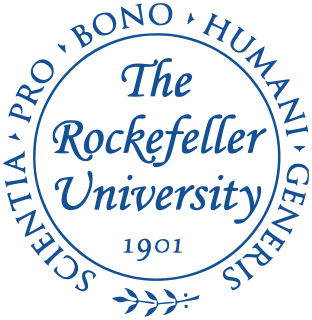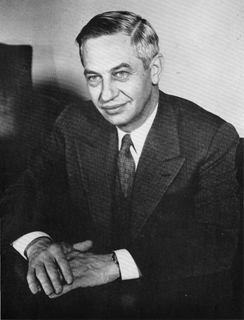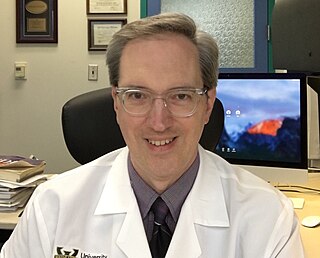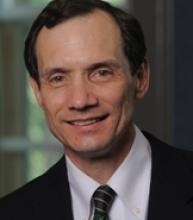Related Research Articles

Stanley Benjamin Prusiner is an American neurologist and biochemist. He is the director of the Institute for Neurodegenerative Diseases at University of California, San Francisco (UCSF). Prusiner discovered prions, a class of infectious self-reproducing pathogens primarily or solely composed of protein. He received the Albert Lasker Award for Basic Medical Research in 1994 and the Nobel Prize in Physiology or Medicine in 1997 for prion research developed by him and his team of experts beginning in the early 1970s.

Oakland University is a public research university in Auburn Hills and Rochester Hills, Michigan. It is the second largest university in the Detroit Metropolitan Area with 20,012 students and it is classified among "R2: Doctoral Universities – High research activity." The university offers 132 bachelor's degree programs and 138 professional graduate certificate, master's degree, and doctoral degree programs, including those offered by the Oakland University William Beaumont School of Medicine.

The Rockefeller University is a private graduate-only university in New York City. It focuses primarily on the biological and medical sciences and provides doctoral and postdoctoral education. It is classified among "R2: Doctoral Universities – High research activity". Rockefeller is the oldest biomedical research institute in the United States. The 82-person faculty has 37 members of the National Academy of Sciences, 17 members of the National Academy of Medicine, seven Lasker Award recipients, and five Nobel laureates. As of March 2022, a total of 26 Nobel laureates have been affiliated with Rockefeller University.

Lee Alvin DuBridge was an American educator and physicist, best known as president of the California Institute of Technology from 1946–1969.

The Duke University School of Medicine, commonly known as Duke Med, is the medical school of Duke University. It is located in the Collegiate Gothic-style West Campus of Duke University in Durham, North Carolina. The School of Medicine, along with the Duke University School of Nursing, Duke University Hospital, Duke Regional Hospital, Duke Children's Hospital, Duke Raleigh Hospital, and other affiliated hospitals, clinics, and laboratories, make up the Duke University Health System. Established in 1925 by James B. Duke, the School of Medicine has earned its reputation as an integral part of one of the world's foremost patient care and biomedical research institutions.

The President's Council of Advisors on Science and Technology (PCAST) is a council, chartered in each administration with a broad mandate to advise the President of the United States on science and technology. The current PCAST was established by Executive Order 13226 on September 30, 2001, by President George W. Bush, was re-chartered by President Obama's April 21, 2010, Executive Order 13539, by President Trump's October 22, 2019, Executive Order 13895, and by President Biden's February 1, 2021, Executive Order 14007.

Claire M. Fraser is an American genome scientist and microbiologist who has worked in microbial genomics and genome medicine. Her research has contributed to the understanding of the diversity and evolution of microbial life. Fraser is the director of the Institute for Genome Sciences at the University of Maryland School of Medicine in Baltimore, MD, where she holds the Dean's Endowed Professorship in the School of Medicine. She has joint faculty appointments at the University of Maryland School of Medicine in the Departments of Medicine and Microbiology/Immunology. In 2019, she began serving a one-year term as President-Elect for the American Association for the Advancement of Science (AAAS), which will be followed by a one-year term as AAAS president starting in February 2020 and a one-year term as chair of the Board of Directors in February 2021.

The University of Pennsylvania School of Dental Medicine is the dental school of the University of Pennsylvania (Penn), an Ivy League university located in Philadelphia. It is one of twelve graduate schools at Penn and one of several dental schools in Pennsylvania. It is part of the University of Pennsylvania Health System.

Ralph Snyderman is chancellor emeritus at Duke University, James B. Duke Professor of Medicine, and executive director of the Duke Center for Personalized Health Care. He served as chancellor for health affairs and dean of the School of Medicine from 1989 to July 2004. Under his leadership, Duke University created the Duke University Health System (DUHS) to develop and operate a comprehensive health delivery system, and he was its founding President and Chief Executive Officer. DUHS, with its practice networks, ambulatory care centers, home health services, community hospitals, university hospital, and satellite collaborations demonstrated the power of academic medicine to deliver the best of care to broad communities. Snyderman helped lead the creation of the largest academic clinical research organization worldwide. During his tenure, Duke University Hospital was ranked 6th overall in the nation and its medical school ranked 4th. Snyderman is a leader in the conception and development of personalized health care, an evolving model of national health care delivery. He has articulated the need to move the current focus of health care from the treatment of disease-events to personalized, predictive, preventive, and participatory care that is focused on the patient. Ralph Snyderman was the recipient of the 2012 David E. Rogers Award from the Association of American Medical Colleges who recognized him as "The Father of Personalized Medicine." He is a member of the Association of American Medical Colleges, Association of American Physicians, American Academy of Arts & Sciences, and the National Academy of Medicine.
Ann M. Arvin is a pediatrician and professor of Pediatrics and Microbiology/Immunology at Stanford University. Arvin is a specialist of the Varicella zoster virus (VZV) and a prominent national figure in health. Arvin is currently the chief of the infectious diseases division of pediatrics at the Lucile Packard Children's Hospital, as well as the former Stanford's vice provost and dean of research.

George Quentin Daley is the Dean of the Faculty of Medicine, Caroline Shields Walker Professor of Medicine, and Professor of Biological Chemistry and Molecular Pharmacology at Harvard Medical School. He was formerly the Robert A. Stranahan Professor of Pediatrics at Harvard Medical School, Director of the Stem Cell Transplantation Program at Boston Children's Hospital, and an investigator of the Howard Hughes Medical Institute, Associate Director of Children’s Stem Cell Program, a member of the Executive Committee of the Harvard Stem Cell Institute. He is a past president of the International Society for Stem Cell Research (2007–2008).

David Henry Gorski is an American surgical oncologist, professor of surgery at Wayne State University School of Medicine, and a surgical oncologist at the Barbara Ann Karmanos Cancer Institute, specializing in breast cancer surgery. He is an outspoken skeptic, and a critic of alternative medicine and the anti-vaccination movement. He is the author of the blog Respectful Insolence, and the managing editor of the website Science-Based Medicine.
Hang Hubert Yin is a professor and deputy dean of pharmaceutical sciences at Tsinghua University, a recipient of several young scientist awards for his research in chemical biology and drug discovery.
Lorenzo Cohen is a professor in the Department of General Oncology and Behavioral Science and the director of the Integrative Medicine Program at the University of Texas MD Anderson Cancer Center. He is also a distinguished clinical professor at the Fudan University Shanghai Cancer Center in Shanghai, China. Cohen is a founding member and past president of the Society for Integrative Oncology.
Narinder Kumar Mehra is an Indian immunologist, head of the department of transplant immunology and immunogenetics of the SRL Limited, Gurgaon. He is a former dean of research and holds the ICMR Dr. C.G. Pandit National Chair at AIIMS. An elected fellow of the International Medical Sciences Academy, The World Academy of Sciences, Indian National Science Academy and National Academy of Sciences, India, Mehra is known for his research on histocompatibility and immunogenetics. The Council of Scientific and Industrial Research, the apex agency of the Government of India for scientific research, awarded him the Shanti Swarup Bhatnagar Prize for Science and Technology, one of the highest Indian science awards for his contributions to Medical Sciences in 1992. He received the Chevalier of the National Order of Merit from François Mitterrand in 2003.
Javed Naim Agrewala is an Indian immunologist, the prof. at Indian Institute of Technology Ropar and the chief scientist and professor at the Institute of Microbial Technology, Chandigarh. Known for his research on Tuberculosis, Agrewala is an elected fellow of all the three major Indian science academies viz. National Academy of Sciences, India, Indian National Science Academy and Indian Academy of Sciences. The Council of Scientific and Industrial Research, the apex agency of the Government of India for scientific research, awarded him the Shanti Swarup Bhatnagar Prize for Science and Technology, one of the highest Indian science awards for his contributions to Medical Sciences in 2005. He is also a recipient of the National Bioscience Award for Career Development of the Department of Biotechnology.

Katalin Karikó is a Hungarian-American biochemist who specializes in RNA-mediated mechanisms. Her research has been the development of in vitro-transcribed mRNA for protein therapies. She co-founded and was CEO of RNARx, from 2006 to 2013. Since 2013, she has been associated with BioNTech RNA Pharmaceuticals, first as a vice president and promoted to senior vice president in 2019. She also is an adjunct professor at the University of Pennsylvania.

Dr. Michael J. Lenardo, is the Chief of the Molecular Development and Immune System Section and the founder and co-Director of the Clinical Genomics Program at the National Institute of Allergy and Infectious Disease (NIAID), National Institutes of Health (NIH). Trained as a geneticist, molecular biologist, and immunologist, his research examines how cells of the immune system defend themselves against various pathogens, including viruses and bacteria. His research has investigated genetic abnormalities in the immune system, mechanisms of cell death, genetic diseases of immune homeostasis and autoimmunity, and development of novel diagnostics and therapeutics for diseases of the immune system. Lenardo's contributions to science and medicine have shown the possibilities of genomic research in developing precision medicine diagnoses and treatments for disease in humans. In 2006 he was appointed Officer of the Most Excellent Order of the British Empire (O.B.E.) by Queen Elizabeth II. In 2019 he was inducted into the National Academies of Sciences and the National Academy of Medicine, considered among the highest honors awarded to a U.S scientist and medical researcher respectively.

Drew Weissman is an American physician-scientist best known for his contributions to RNA biology. His work helped enable development of effective mRNA vaccines, the best known of which are those for COVID-19 produced by BioNTech/Pfizer and Moderna. Weissman is a professor of medicine at the Perelman School of Medicine at the University of Pennsylvania (Penn). He and his research colleague Katalin Karikó have received numerous awards including the presigious Lasker-DeBakey Clinical Medical Research Award.
Howard E. Gendelman is an American physician-scientist whose research intersects the disciplines of neuroimmunology, pharmacology, and infectious diseases. Gendelman was born in Philadelphia, Pennsylvania. He is renowned for his research in harnessing immune responses for therapeutic gain in HIV/AIDS and Neurodegenerative disease. He is an author, editor, educator, and mentor.
References
- ↑ MichBio Board of Directors' Biographies, archived from the original on 2010-03-01, retrieved 2010-09-03
- ↑ "Oakland University - Undergraduate Education - New Faculty - Bios 2009". Archived from the original on 2009-12-24. Retrieved 2010-02-25.
- ↑ "Archived copy" (PDF). Archived from the original (PDF) on 2011-07-14. Retrieved 2010-02-25.
{{cite web}}: CS1 maint: archived copy as title (link) - ↑ "Tuesday, June 28, 2016 | Gus Lloyd's Reflections". Archived from the original on 2016-08-06. Retrieved 2016-06-29.
- ↑ "BEAUMONT DOCTOR GETS INTEGRATIVE MEDICINE AWARD | Beaumont Health System". www.beaumonthospitals.com. Archived from the original on 9 August 2011. Retrieved 22 May 2022.
- ↑ "Building Bridges of Integration for Traditional Chinese Medicine". Archived from the original on 2007-08-21. Retrieved 2010-02-25.